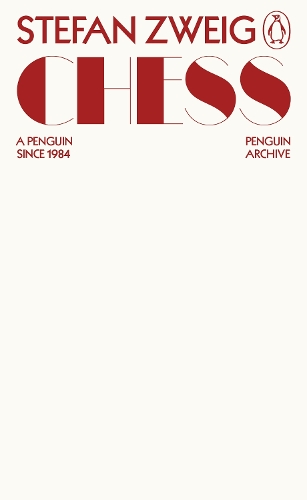
Chess: A Novel
(Paperback)
Available Formats
Paperback
Published: 15th July 2025
Paperback
Published: 18th September 2017
Hardback
Published: 5th September 2023
Publishing Details
Chess: A Novel
By (Author) Stefan Zweig
Translated by Anthea Bell
Penguin Books Ltd
Penguin Classics
15th July 2025
17th April 2025
United Kingdom
Classifications
General
Fiction
Fiction in translation
833.912
Physical Properties
Paperback
96
Width 111mm, Height 180mm, Spine 6mm
64g
Description
90 classic titles celebrating 90 years of Penguin Books My delight in playing turned to a lust for playing, my lust for playing into a compulsion to play, a mania, a frenetic fury that filled not only my waking hours but also came to invade my sleep. I could think of nothing but chess, I thought only in chess moves and chess problems . . . As a chess obsessive, what if you have a once-in-a-lifetime opportunity to play the world champion, but it might send you to the edge of madness . . . and tip you over
Reviews
A brilliant writerNew York Times
One of the joys of recent years is the translation into English of Stefan Zweig's storiesEdmund de Waal
Stefan Zweig was a late and magnificent bloom from the hothouse of fin de siecle ViennaThe Wall Street Journal
Zweig is one of the masters of the short story and novella, and by 'one of the masters' I mean that he's up there with Maupassant, Chekhov, James, Poe, or indeed anyone you care to nameNick Lezard, Guardian
A new favourite writer of mineWes Anderson
Perhaps the best chess story ever written, perhaps the best about any gameEconomist
His great achievement in short formThe Times
Author Bio
Stefan Zweig was born in 1881 in Vienna to a wealthy Austrian-Jewish family. Recognition as a writer came early for Zweig; by the age of forty, he had already won literary fame. In 1934, with Nazism entrenched, Zweig left Austria for England, and became a British citizen in 1940. In 1941 he and his second wife went to Brazil, where they committed suicide. Zweig's best-known works of fiction are Beware of Pity (1939) and Chess (1942), but his most outstanding accomplishments were his many biographies, which were based on psychological interpretation.
